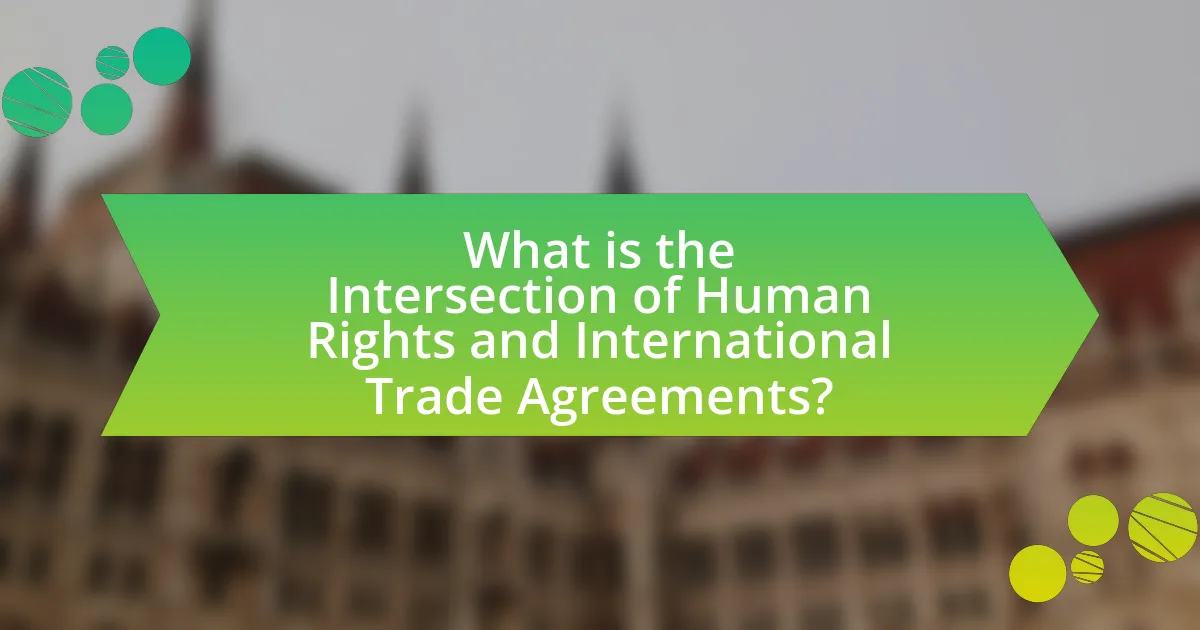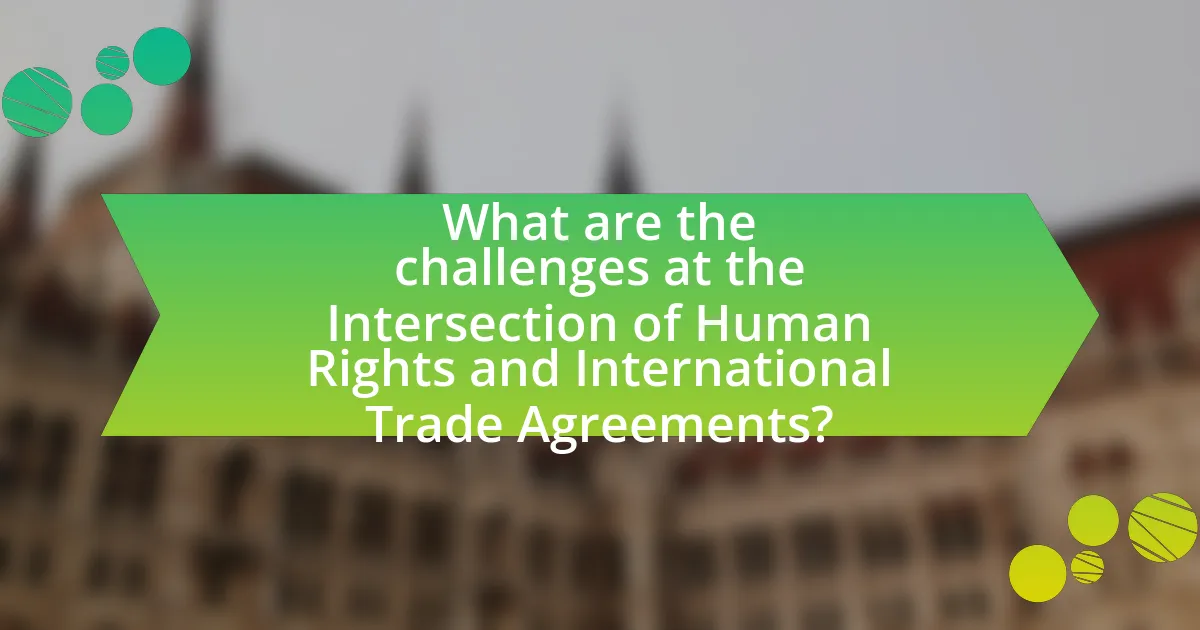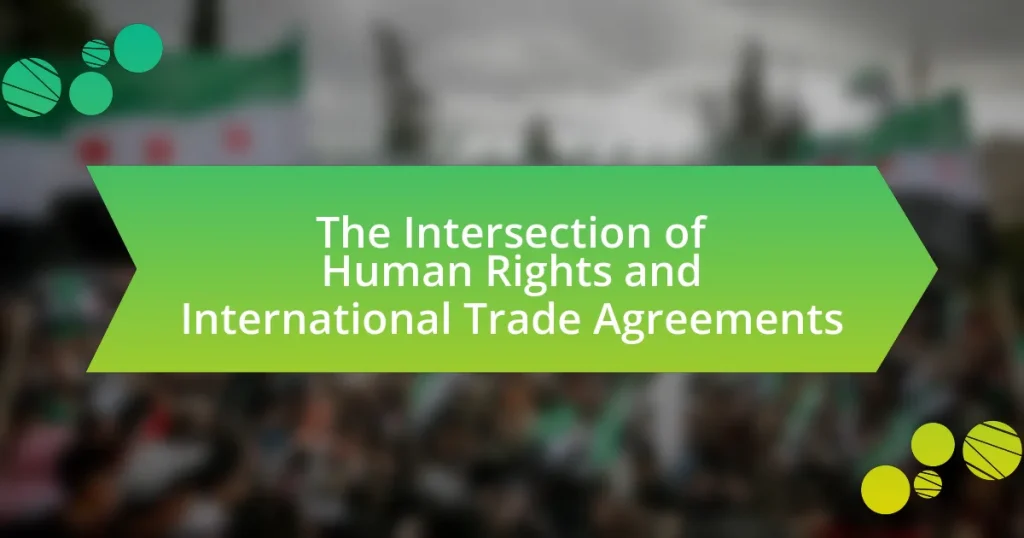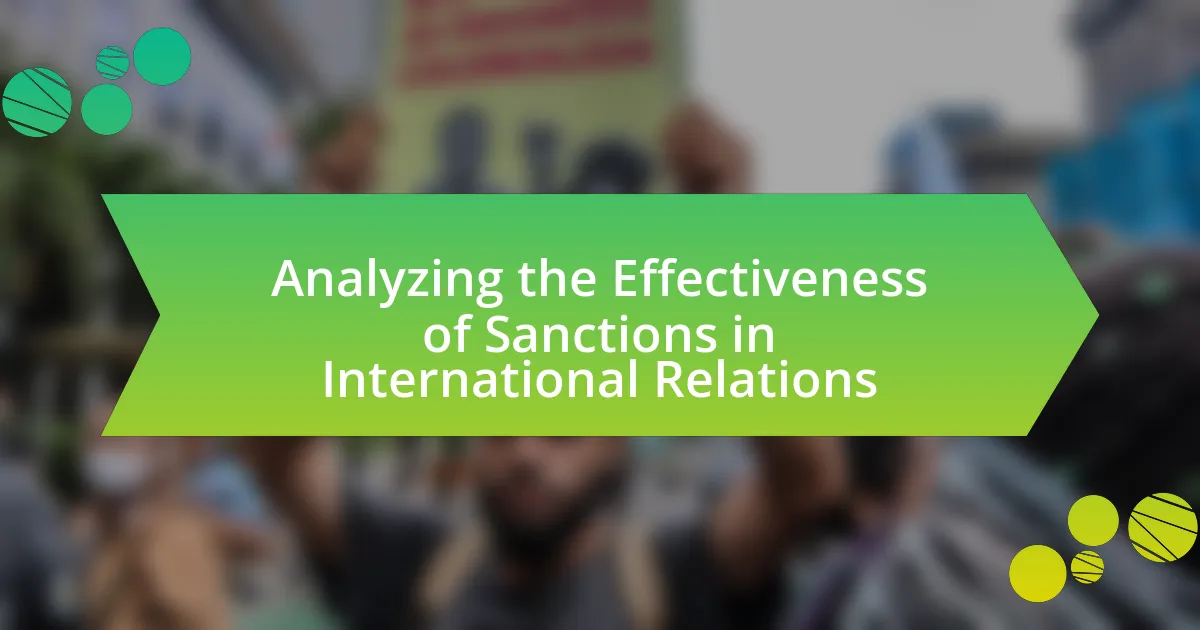The article examines the intersection of human rights and international trade agreements, highlighting how trade policies increasingly incorporate human rights standards. It discusses the relationship between trade agreements and human rights, emphasizing the importance of labor rights, environmental protections, and anti-discrimination measures. Key principles such as non-discrimination, fair wages, and the right to work are outlined, along with the impact of trade agreements on human rights enforcement. The article also addresses challenges in integrating human rights into trade agreements, the role of multinational corporations, and best practices for aligning trade with human rights obligations. Additionally, it explores future trends and innovations that could enhance the protection of human rights in international trade.

What is the Intersection of Human Rights and International Trade Agreements?
The intersection of human rights and international trade agreements involves the integration of human rights standards into trade policies and practices. This relationship is evident as trade agreements increasingly include provisions that promote labor rights, environmental protections, and anti-discrimination measures. For instance, the North American Free Trade Agreement (NAFTA) included side agreements on labor and environmental standards, reflecting a growing recognition that trade should not undermine human rights. Additionally, the World Trade Organization (WTO) acknowledges the importance of sustainable development, which encompasses human rights considerations. These examples illustrate how trade agreements can serve as platforms for advancing human rights while facilitating economic cooperation.
How do human rights and international trade agreements relate to each other?
Human rights and international trade agreements are interconnected as trade agreements can influence the protection and promotion of human rights within participating countries. For instance, trade agreements often include provisions that require adherence to labor rights, environmental standards, and anti-corruption measures, which are essential components of human rights. The inclusion of such provisions aims to ensure that economic benefits do not come at the expense of fundamental rights. An example is the United States-Mexico-Canada Agreement (USMCA), which incorporates labor rights protections to improve working conditions and uphold human rights in the labor market. This relationship highlights how trade policies can serve as tools for advancing human rights standards globally.
What are the key principles of human rights in the context of trade?
The key principles of human rights in the context of trade include non-discrimination, the right to work, fair wages, and the protection of labor rights. Non-discrimination ensures that all individuals have equal access to trade opportunities regardless of race, gender, or socioeconomic status, as outlined in the Universal Declaration of Human Rights. The right to work emphasizes that everyone should have the opportunity to earn a living through freely chosen employment, which is supported by the International Covenant on Economic, Social and Cultural Rights. Fair wages are essential to uphold the dignity of workers, ensuring that compensation reflects the cost of living and promotes a decent standard of living. Additionally, the protection of labor rights, including the right to organize and engage in collective bargaining, is crucial for safeguarding workers’ interests in trade agreements. These principles collectively aim to create a fair and equitable trading environment that respects and promotes human rights.
How do trade agreements impact the enforcement of human rights?
Trade agreements can significantly influence the enforcement of human rights by incorporating specific labor and environmental standards that member countries must adhere to. These agreements often include provisions that promote fair labor practices, prohibit child labor, and ensure safe working conditions, thereby creating a framework for accountability. For instance, the North American Free Trade Agreement (NAFTA) included side agreements on labor and environmental standards, which aimed to improve conditions in Mexico and protect workers’ rights. Additionally, trade agreements can leverage economic incentives to encourage compliance with human rights norms, as countries may face trade sanctions or loss of access to markets if they violate these standards. This linkage between trade and human rights enforcement has been increasingly recognized in recent years, as seen in the European Union’s trade agreements that explicitly address human rights issues, making compliance a condition for trade benefits.
Why is the intersection of human rights and trade agreements important?
The intersection of human rights and trade agreements is important because it ensures that economic activities do not undermine fundamental rights and freedoms. Trade agreements can influence labor standards, environmental protections, and social justice, thereby impacting the well-being of individuals and communities. For instance, the inclusion of human rights clauses in trade agreements, such as those seen in the European Union’s trade deals, aims to promote ethical practices and accountability among trading partners. This approach is supported by evidence showing that countries with strong human rights protections tend to have more sustainable economic growth, as highlighted in reports by organizations like the World Bank.
What are the potential consequences of neglecting human rights in trade?
Neglecting human rights in trade can lead to significant social, economic, and political consequences. Socially, it can result in increased inequality and exploitation of vulnerable populations, as seen in cases where labor rights are disregarded, leading to poor working conditions and child labor. Economically, countries that ignore human rights may face trade sanctions or loss of market access, as evidenced by the European Union’s use of trade agreements to promote human rights standards, which can impact a nation’s economy. Politically, neglecting human rights can lead to instability and conflict, as marginalized groups may resort to protests or violence, undermining governance and security. These consequences highlight the critical need for integrating human rights considerations into international trade agreements to promote sustainable development and social justice.
How can trade agreements promote human rights protections?
Trade agreements can promote human rights protections by incorporating specific labor and environmental standards that countries must adhere to in order to benefit from trade. These agreements often include clauses that require signatory nations to uphold fundamental human rights, such as the right to fair wages, safe working conditions, and the prohibition of child labor. For instance, the United States-Mexico-Canada Agreement (USMCA) includes provisions aimed at improving labor rights in Mexico, which is intended to enhance protections for workers and promote fair labor practices. By linking trade benefits to human rights compliance, these agreements create incentives for countries to improve their human rights records, thereby fostering a more equitable global trading environment.

What are the challenges at the Intersection of Human Rights and International Trade Agreements?
The challenges at the intersection of human rights and international trade agreements include the prioritization of economic interests over human rights protections, the lack of enforceable human rights standards within trade agreements, and the potential for trade agreements to undermine labor rights and environmental protections. Economic interests often take precedence, leading to situations where countries may overlook human rights violations to secure trade deals. Additionally, many trade agreements do not incorporate binding human rights obligations, making it difficult to hold parties accountable for violations. For instance, the North American Free Trade Agreement (NAFTA) has been criticized for not adequately addressing labor rights, resulting in exploitation and poor working conditions. These challenges highlight the need for integrating robust human rights frameworks into international trade agreements to ensure that economic growth does not come at the expense of fundamental rights.
What obstacles do countries face in integrating human rights into trade agreements?
Countries face several obstacles in integrating human rights into trade agreements, primarily due to conflicting national interests, economic priorities, and varying interpretations of human rights standards. National interests often prioritize economic growth and trade benefits over human rights considerations, leading to resistance in including such provisions. Additionally, countries may have different legal frameworks and cultural contexts that influence their understanding and implementation of human rights, complicating negotiations. For instance, the lack of a universally accepted definition of human rights can create discrepancies in how countries approach these issues in trade discussions. Furthermore, powerful lobbying from industries that may be negatively impacted by human rights regulations can hinder progress, as seen in sectors like agriculture and manufacturing where labor rights are often contested.
How do economic interests conflict with human rights considerations?
Economic interests often conflict with human rights considerations when profit-driven motives prioritize financial gain over the protection of individual rights. For instance, multinational corporations may exploit labor in countries with lax labor laws, leading to human rights violations such as child labor and unsafe working conditions. A notable example is the garment industry in Bangladesh, where companies have faced criticism for poor labor practices despite significant profits. Reports indicate that in 2013, the Rana Plaza collapse, which killed over 1,100 workers, highlighted the dire consequences of prioritizing economic interests over human rights. This demonstrates that economic pursuits can undermine the enforcement of human rights standards, creating a tension between profit and ethical responsibility.
What role do multinational corporations play in this intersection?
Multinational corporations play a significant role in the intersection of human rights and international trade agreements by influencing labor practices and regulatory standards across borders. These corporations often shape the terms of trade agreements, which can include provisions related to labor rights, environmental protections, and corporate social responsibility. For instance, the inclusion of labor standards in trade agreements, such as the United States-Mexico-Canada Agreement (USMCA), reflects the pressure from multinational corporations to ensure ethical practices in their supply chains. This influence can lead to improved labor conditions in developing countries, as corporations may adopt higher standards to align with international expectations and consumer demands for ethical sourcing.
How do different countries approach human rights in trade agreements?
Different countries approach human rights in trade agreements through varying degrees of integration and enforcement mechanisms. For instance, the European Union incorporates human rights clauses in its trade agreements, mandating compliance with international human rights standards as a condition for trade benefits. In contrast, the United States has historically included human rights considerations in trade agreements, but the emphasis can vary significantly depending on the administration; for example, the US-Mexico-Canada Agreement includes labor rights provisions aimed at improving working conditions. Additionally, countries like Canada have adopted a more explicit approach by including human rights impact assessments in their trade negotiations, ensuring that trade policies do not undermine human rights. These approaches reflect differing national priorities and the influence of civil society in shaping trade policy, demonstrating that the integration of human rights in trade agreements is not uniform but rather context-dependent.
What are examples of countries that prioritize human rights in their trade policies?
Countries that prioritize human rights in their trade policies include Sweden, Canada, and the Netherlands. Sweden incorporates human rights considerations into its trade agreements, emphasizing labor rights and environmental standards. Canada has established a framework that includes human rights impact assessments for trade deals, ensuring that trade does not undermine human rights. The Netherlands actively promotes human rights in its trade relations, linking trade agreements to commitments on human rights and sustainable development. These countries demonstrate a commitment to integrating human rights into their international trade practices.
How do cultural differences influence the approach to human rights in trade?
Cultural differences significantly influence the approach to human rights in trade by shaping the values and priorities that countries emphasize in their trade agreements. For instance, Western nations often prioritize individual rights and labor standards, advocating for clauses that protect workers’ rights and promote gender equality. In contrast, some Asian countries may focus more on economic development and stability, leading them to prioritize trade benefits over stringent human rights conditions. This divergence is evident in trade agreements like the Comprehensive and Progressive Agreement for Trans-Pacific Partnership (CPTPP), where member countries negotiated varying levels of commitment to labor rights based on their cultural contexts. Such differences can result in inconsistent enforcement of human rights standards across international trade, reflecting the underlying cultural values that inform each country’s approach.

What are the best practices for aligning Human Rights with International Trade Agreements?
Best practices for aligning Human Rights with International Trade Agreements include incorporating human rights clauses into trade agreements, conducting human rights impact assessments, and ensuring stakeholder engagement. Incorporating human rights clauses ensures that trade agreements explicitly commit to upholding human rights standards, as seen in the European Union’s trade agreements which often include such provisions. Conducting human rights impact assessments prior to finalizing trade agreements allows for the identification of potential negative impacts on human rights, a practice supported by the UN Guiding Principles on Business and Human Rights. Ensuring stakeholder engagement, particularly with affected communities and civil society organizations, fosters transparency and accountability, as demonstrated by the consultations held during the negotiation of the Comprehensive and Progressive Agreement for Trans-Pacific Partnership (CPTPP). These practices collectively enhance the alignment of trade agreements with human rights obligations.
How can policymakers ensure human rights are considered in trade negotiations?
Policymakers can ensure human rights are considered in trade negotiations by integrating human rights assessments into the negotiation process. This can be achieved by establishing clear guidelines that mandate the evaluation of human rights impacts prior to finalizing trade agreements. For instance, the European Union has implemented a framework that requires human rights impact assessments for trade agreements, which helps identify potential violations and promotes accountability. Additionally, engaging civil society organizations during negotiations can provide valuable insights and foster transparency, ensuring that the voices of affected communities are heard.
What frameworks exist for integrating human rights into trade agreements?
Frameworks for integrating human rights into trade agreements include the United Nations Guiding Principles on Business and Human Rights, the International Labour Organization’s core labor standards, and the European Union’s Trade and Sustainable Development chapters. These frameworks provide guidelines for ensuring that trade agreements promote and protect human rights by incorporating labor rights, environmental standards, and mechanisms for accountability. For instance, the UN Guiding Principles emphasize the responsibility of businesses to respect human rights throughout their operations, while the ILO standards set benchmarks for fair labor practices. The EU’s approach often includes specific commitments to uphold human rights within trade agreements, reinforcing the importance of ethical considerations in international trade.
How can civil society organizations influence trade agreements for better human rights outcomes?
Civil society organizations can influence trade agreements for better human rights outcomes by advocating for the inclusion of human rights provisions in the negotiation process. These organizations engage in lobbying efforts, public campaigns, and research to raise awareness about human rights issues related to trade. For instance, the International Trade Union Confederation has successfully pushed for labor rights to be integrated into trade agreements, demonstrating that organized advocacy can lead to concrete changes in policy. Additionally, civil society organizations often provide critical data and case studies that highlight the potential human rights impacts of proposed agreements, thereby informing policymakers and the public.
What role does public awareness play in the intersection of human rights and trade?
Public awareness plays a crucial role in the intersection of human rights and trade by influencing policy decisions and corporate practices. When the public is informed about human rights violations linked to trade practices, it can lead to increased pressure on governments and businesses to adopt ethical standards. For instance, campaigns against sweatshop labor have prompted companies to implement fair labor practices and transparency in their supply chains. Research from the International Labour Organization indicates that public scrutiny can lead to significant improvements in labor conditions, demonstrating that informed consumers can drive change in trade policies that respect human rights.
How can consumers advocate for human rights in trade practices?
Consumers can advocate for human rights in trade practices by supporting ethical brands and demanding transparency in supply chains. By choosing to purchase from companies that prioritize fair labor practices and sustainable sourcing, consumers can influence market trends and encourage businesses to adopt responsible practices. For instance, the 2019 Ethical Consumer Markets Report indicated that the ethical consumer market in the UK grew to £41.1 billion, demonstrating a significant consumer shift towards brands that uphold human rights. Additionally, consumers can engage in activism by signing petitions, participating in campaigns, and communicating with policymakers to promote regulations that protect human rights in trade. This collective action can lead to greater accountability and reform in international trade agreements.
What strategies can be employed to raise awareness about this intersection?
To raise awareness about the intersection of human rights and international trade agreements, targeted advocacy campaigns can be employed. These campaigns should focus on educating stakeholders, including policymakers, businesses, and the public, about the implications of trade agreements on human rights. For instance, organizations like Human Rights Watch and Amnesty International have successfully utilized reports and public forums to highlight specific cases where trade policies have adversely affected human rights, thereby influencing public opinion and legislative action. Additionally, leveraging social media platforms can amplify these messages, reaching a broader audience and fostering community engagement around the issue.
What are the future trends in the intersection of Human Rights and International Trade Agreements?
Future trends in the intersection of Human Rights and International Trade Agreements include the increasing incorporation of human rights clauses in trade agreements and a growing emphasis on corporate social responsibility. As countries recognize the importance of aligning trade policies with human rights standards, agreements are likely to feature explicit commitments to uphold labor rights, environmental protections, and anti-discrimination measures. For instance, the European Union has been proactive in integrating human rights considerations into its trade agreements, as seen in the EU-Mercosur agreement, which includes provisions aimed at promoting sustainable development and human rights. This trend reflects a broader shift towards ensuring that trade does not come at the expense of human rights, driven by public demand for ethical trade practices and accountability in global supply chains.
How might global movements impact trade agreements and human rights?
Global movements can significantly influence trade agreements and human rights by advocating for ethical standards and social justice. For instance, movements such as the Fair Trade movement have pressured governments and corporations to incorporate labor rights and environmental protections into trade agreements. This pressure has led to the inclusion of clauses that promote human rights, as seen in the United States-Mexico-Canada Agreement (USMCA), which emphasizes labor rights and environmental standards. Additionally, global movements raise awareness about human rights violations, compelling nations to reconsider trade partnerships with countries that do not uphold these standards, thereby impacting the negotiation and implementation of trade agreements.
What innovations could enhance the protection of human rights in trade?
Innovations that could enhance the protection of human rights in trade include the implementation of blockchain technology for supply chain transparency and the establishment of binding human rights clauses in trade agreements. Blockchain technology allows for real-time tracking of goods, ensuring that companies adhere to ethical labor practices and environmental standards, thereby reducing the risk of human rights violations. For instance, a study by the World Economic Forum highlights how blockchain can provide verifiable data on labor conditions, which can be crucial for accountability. Additionally, incorporating binding human rights clauses in trade agreements, as seen in the European Union’s trade deals, mandates compliance with human rights standards, thus holding corporations accountable for their practices in partner countries. This dual approach of leveraging technology and legal frameworks can significantly strengthen the protection of human rights in international trade.






